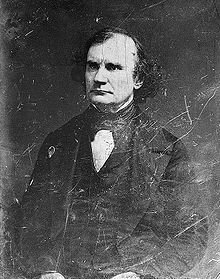James Murray Mason
James Murray Mason, Sr. (born November 3, 1798 on Analostan Island, Fairfax County , Virginia (now Theodore Roosevelt Island, Washington, DC ); † April 28, 1871 in "Clarens", near Alexandria , Virginia) was a US American politician in the 19th century .
Career
Mason was tutored by a private tutor and then attended an academy in Georgetown , Washington, DC He then graduated from the University of Pennsylvania in Philadelphia in 1818 and from the Legal Department of the College of William and Mary in Williamsburg in 1820 . He was admitted to the bar that same year and began practicing in Winchester , Virginia in 1821 .
He chose a political career in 1825 when he was elected to the Virginia House of Representatives, where he served in 1826 and then again from 1829 to 1832. He also represented Virginia at its constitutional convention in 1829 and was the presidential elector for the Democrats in 1832. He was then elected as Jackson Democrat in the 25th US Congress , where he represented the 12th electoral district of Virginia. He stayed there from March 4, 1837 to March 3, 1839.
He was then elected a Democrat to the US Senate in 1847 to fill the vacancy created by the death of Isaac S. Pennybacker . He was re-elected in 1850 and 1856. Mason worked there from January 21, 1847 to March 28, 1861. When the American Civil War broke out, he left Washington without stepping down from his seat in the US Senate. He was one of ten Southern Senators expelled in absentia from the US Senate on July 11, 1861 for supporting the rebellion. During his time in the US Senate was he during the 34th and 35th US Congress the President Pro Tempore in the US Senate. He was also the chairman of the Committee on Claims ( 30th US Congress ), the Committee on the District of Columbia ( 31st US Congress ), the Committee on Foreign Relations (from 32nd to 36th US Congress ) and of the Committee on Naval Affairs (32nd US Congress). In 1850 he wrote the second version of the Fugitive Slave Law of 1850 .
After the Virginia secession in 1861, James Murray Mason was elected to the Provisional Confederate Congress. In the same year he was also appointed Ambassador of the Confederate States to Great Britain and France . As he was about to take up his post, his ship, the British mail steamer Trent, was seized by a Union ship on November 8, 1861 . James Murray Mason was captured and imprisoned at Fort Warren in Boston Harbor. The resulting Trent affair almost led to Britain entering the war on the Confederate side. Mason was released on January 1, 1862, and continued his journey to London . Once there, he represented the Confederate States until their fall in April 1865. After the war he lived in Canada until 1868 and then returned to Virginia.
Mason died in 1871 at "Clarens" near the city of Alexandria, Virginia, where he was subsequently buried in the Christ Church Episcopal Cemetery .
family
He was the son of John Mason (1766–1849) and Anna Maria (Murray) Mason (1776–1857), the grandson of George Mason , the great-nephew of Thomson Mason and the first cousin of Stevens Thomson Mason (1760–1803) , John Thomson Mason (1765-1824), Thomson Francis Mason , John Thomson Mason, Jr., and Charles O'Conor Goolrick . In addition, he was the second cousin of Armistead Thomson Mason , John Thomson Mason (1787-1850) and Stevens Thomson Mason (1811-1843).
On July 25, 1822, he married Eliza Margaretta Chew (1798–1874).
Web links
- The Political Graveyard (Engl.)
- James Murray Mason in the Biographical Directory of the United States Congress (English)
| personal data | |
|---|---|
| SURNAME | Mason, James Murray |
| ALTERNATIVE NAMES | Mason, James Murray senior (full name) |
| BRIEF DESCRIPTION | American politician |
| DATE OF BIRTH | November 3, 1798 |
| PLACE OF BIRTH | Georgetown , Washington, DC |
| DATE OF DEATH | April 28, 1871 |
| Place of death | Clarens, near Alexandria , Virginia |


